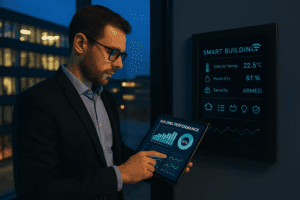Construction projects are akin to complex machines—with numerous gears and cogs that must align perfectly to maintain the delicate balance of progress and productivity. Any industry professional understands that construction delays are not just inconveniences; they are the sand in the gears that can grind projects to a halt and have far-reaching consequences. Importantly, the impact of these delays is not solely economic; the mental well-being of the workers on the construction site, who endure most of the pressure, is also at stake. In this blog, we delve into strategies that help overcome construction delays and, crucially, propose ways to maintain and enhance the mental health of construction workers.
Introduction
Welcome to a comprehensive exploration of overcoming hurdles in construction projects while nurturing the mental well-being of the workforce. The construction industry, characterized by its high stakes and high-pressure environments, is prone to challenges. These range from logistical complexities to unforeseen environmental factors, all of which can cause significant delays.
The purpose of this blog is to unravel these challenges and to underscore the often-underappreciated aspect of construction work—the mental health of its workforce. The culture within construction has traditionally been one of ‘toughing it out’, but the tides are changing, and the industry is coming to understand that mental health is as critical as physical safety on the job site.
For construction professionals, stakeholders, and participants, there is a collective responsibility to ensure that projects are executed efficiently to minimize delays. Equally, there is a duty of care to the workforce who are the backbone of the industry. In this piece, we aim to foster a dual-focused approach to construction management, which considers both the success of the project and the well-being of the people who make it possible.
The Underlying Issues

The complexities of construction delays are multifaceted and can stem from a myriad of root causes. Issues such as supply chain disruptions, unexpected weather conditions, and unplanned reworks can significantly push back project schedules. These delays, while detrimental to project outcomes, also have a profound effect on the workers. Stretched timelines often translate to increased pressure on teams to meet deadlines, which can strain mental health.
Construction work is already recognized as one of the more physically demanding professions, with long hours and a propensity for hazardous conditions. What is less visible is the mental toll these demands take on workers. The uncertainty and instability brought on by delays can exacerbate stress levels, leading to burnout, anxiety, and depression.
Research in the field of occupational health has begun to shed light on the reality that mental health in construction is a critical issue that needs addressing. A study by the Centers for Disease Control and Prevention (CDC) has highlighted the construction industry as having one of the highest rates of suicide compared to other professions. This harrowing statistic is a call to action—the industry must prioritize mental health as diligently as it does physical safety.
III. Five Strategies to Overcome Construction Delays
a. Proactive Planning
Proactive planning is akin to setting up a solid foundation before laying the first brick—it is indispensable. This involves meticulous upfront planning, including detailed project timelines, resource allocation, and contingency plans for potential mishaps. The objective is to forecast issues and develop strategies to mitigate them before they arise.
Proactive planning extends beyond schedules and resources; it encompasses effective stakeholder management, thorough contract reviews to ensure clear terms and expectations, and regular progress assessments to adjust plans as needed. By incorporating a proactive mindset, construction managers can preemptively tackle many of the challenges that might cause delays.
b. Effective Communication
The hallmark of any successful construction project is communication. Clear, consistent, and open lines of communication between all parties—managers, workers, suppliers, and clients— help to ensure that everyone is on the same page.
To improve communication within construction teams, the implementation of regular meetings, clear documentation, and the use of collaborative tools are pivotal. Additionally, fostering an environment where feedback is encouraged and acted upon can prevent issues from compounding and can expedite resolutions.
c. Use of Modern Technology
In an era where technology is advancing at a breakneck pace, the construction industry has a wealth of tools at its disposal to enhance productivity and reduce delays. Project management software, Building Information Modelling (BIM), and other digital tools facilitate better planning, communication, and execution.
Adoption of these technologies can lead to improved accuracy in project timelines, budgeting, and resource management. They offer real-time insights and data-driven decision-making, which can be the difference between a project delivered on schedule and one that flounders due to preventable delays.
d. Regular Training and Skill Development
An investment in the workforce is an investment in the project’s success. Regular training and skill development not only equip workers with the necessary technical skills but also foster a sense of value and empowerment.
An adept workforce can work more independently, solve problems on-site, and carry out their duties with greater efficiency—all of which contribute to minimizing delays. Furthermore, by prioritizing training and development, construction companies can address skill shortages, which is a common cause of project stagnation.
e. Risk Management
Risk Management is an essential strategic discipline that anticipates and mitigates potential pitfalls throughout the lifecycle of a construction project. It’s about foreseeing what could go wrong—be it through environmental scans, safety audits, or market analyses—and planning accordingly.
By identifying potential risks early on and having a robust response strategy, construction managers can preemptively address issues that may lead to significant delays. Transparent risk registers and regular risk assessments ensure that all stakeholders are aware of potential challenges and can collectively work towards avoiding or minimizing their impact.
IV. Strategies to Safeguard Workers’ Mental Health
a. Promoting Mental Health Awareness
Promoting mental health awareness on a construction site is about creating an environment where mental health is recognized as being as important as physical health. It involves educating the workforce about mental health, reducing stigma, and encouraging open discussions.
b. Building a Supportive Work Environment
A supportive work environment is one where workers feel their concerns are heard and addressed, where diversity is celebrated, and where inclusion is the norm. It includes providing adequate tools and resources for the job, offering constructive feedback, and acknowledging excellent work. Such an environment has been shown to boost morale and reduce work-related stress.
c. Providing Mental Health Support
Providing mental health support means offering access to mental health professionals, employee assistance programs, and resources like stress management workshops. These services must be readily available, and workers should be encouraged to utilize them without fear of judgment or repercussions.
d. Encouraging Work-Life Balance
A healthy work-life balance is essential for mental well-being. This balance can be encouraged by respecting working hours, allowing flexible schedules where possible, setting realistic deadlines, and ensuring that personal time is valued and protected.
e. Regular Stress Management Sessions
Regular stress management sessions can equip workers with the tools to handle stress effectively. These may include techniques such as mindfulness, deep breathing exercises, yoga, or simply creating spaces on-site where workers can take a moment to decompress.
V. Conclusion
In conclusion, the strategies outlined herein present a comprehensive approach to tackling construction delays and promoting mental health in the construction industry. It is a call to action for companies to rigorously implement proactive planning and embrace effective communication. It is an invitation to harness modern technology and invest in continuous training. Moreover, it is an appeal to prioritize risk management not just as a business imperative but as a responsibility to the workforce.
These strategies are not just pathways to more efficient projects; they are the building blocks of a culture that values the mental health and well-being of its workers. As industry leaders, managers, and team members, it is a collective duty to ensure that the vibrancy of the construction site is matched by the vibrancy of the workers’ lives—both on and off the job site.
Thus, we leave you with a call to integrate these strategies into your construction management practices. We encourage you to advocate for policies that support these goals and to champion the change that will lead to healthier, happier, and more productive construction environments. Together, we can build not only structures but also a future where the construction industry is as robust in its support of mental health as it is in its ability to overcome challenges and complete projects successfully.
VertPro.com serves as a resourceful platform for property owners and managers seeking to enhance their buildings’ energy efficiency. The site offers a range of services, including Commercial Energy Audits, Benchmark Compliance consultancy, and a Construction Marketplace. At the heart of VertPro® is a suite of SaaS technology-based solutions designed to assist in navigating the complexities of Energy Benchmarking and Energy Audits/RCx Plus, while ensuring adherence to over 60 Energy Benchmarking and Energy Efficiency Laws across the country.
For those looking to improve their property’s energy usage and operational value, VertPro.com provides a diverse array of tools and information. The site aims to facilitate a better understanding of energy efficiency practices and legislation, helping building owners and property managers make informed decisions about their energy strategies while complying with all energy ordinances and laws.
















